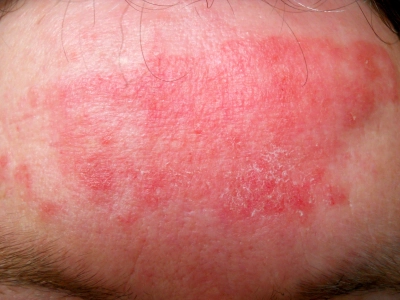 ATOPIC DERMATITIS
ATOPIC DERMATITIS
ATOPIC DERMATITIS IS AN IMMUME SYSTEM DISORDER AND A BARRIER DISORDER. AFFECTED PATIENTS HAVE A PREDISPOSITION THAT CAUSES THEIR SKIN TO OVERREACT TO CERTAIN SUBSTANCES IN THE ENVIRONMENT.
Photo: © TwilightArtPicures - stock.adobe.com
Book your appointment here
WHAT IS ATOPIC DERMATITIS?
Atopic dermatitis is an immune system disorder and a barrier disorder. Affected patients have a predisposition that causes their skin to overreact to certain substances in their environment. Also called atopic dermatitis or atopic eczema, it usually occurs in phases, coming and going according to exposure to triggers. Itchy, reddened and inflamed areas are the main accompanying symptoms. Atopic dermatitis can affect everyone, from toddlers to elderly people. Patients often also suffer from other diseases of the so-called "atopy" such as hay fever and asthma.
Patients usually have a genetic disposition, or an inherited disposition to the condition. Additional factors are the immune system and a dysfunctional skin barrier. For example, we often observe an aggravation of the symptoms in winter when the skin is not properly cared for and becomes drier. If a person has a general susceptibility to the condition, many factors can trigger the next outbreak. These triggers can be food as well as clothing, sweat or skincare products. Particular attention should be paid to stress, both psychological and general.
Everyone reacts in a different way to stimuli from the environment. It is of great importance to observe, record and analyze any potential triggers linked to each new outbreak. There is still no medical cure for atopic dermatitis, though coordinated treatment ensures significant relief.
I would be happy to advise you on the treatments available. Please make an appointment:
HOW TO DETECT ATOPIC DERMATITIS
As with almost every disease, early detection is a determining factor for successful relief. With atopic dermatitis, we know that there is no real cure. Typical symptoms are reddened areas of the skin, mostly on the face, on the scalp, in the bends of the arms and legs and behind the ears.
The person suffers from severe itching, which in turn causes the fingernails to damage the protective skin barrier. Bacteria can then penetrate more easily, causing inflammation of the skin.
Atopic dermatitis usually has two phases:
- Acute phase: during a relapse it is advisable to consult a dermatologist who can recommend the right medication to limit the new outbreak.
- Non-acute phase: here it is important to avoid the factors that can trigger a new outbreak: clothing, pets, mites, certain foods, skincare products and of course psychological and general stress.
WHAT TREATMENT IS AVAILABLE?
Treatment is offered in stages. Permanent skincare is important to prevent deterioration and to restore and protect the skin barrier. There are now several cortisone-free treatment options. For severe cases, antibody (biologic) therapy has also been available for some years. It is important to receive comprehensive, holistic treatment in order to get the condition under control.
ATOPIC DERMATITIS RELATED TO ALLERGIES AND INTOLERANCES:
If you suffer from eczema, different food combinations have a different effect on the skin. With a prick or blood test, you can determine a wide variety of allergies and thus adjust your eating behavior accordingly.
Atopic dermatitis sufferers are also more likely to suffer from hay fever and allergic asthma. It is important to identify the allergen in order to avoid the trigger, or even to begin a course of immunotherapy.
There is an equivalent to almost every type of food that may be better tolerated and will taste just as good.
HOW ARE MICROBIOMES AND ATOPIC DERMATITIS RELATED?
Research has shown that skin colonization patterns are disrupted in atopic dermatitis patients. The number of "good" inhabitants (bacteria) has decreased, while the "bad" organisms multiply thus causing inflammation.
This modified microbiome pattern is not limited to the affected areas. Even where the skin appears healthy, bacterial colonization deviates from the natural pattern. Inflammation in just one area leads to a marked change of the entire skin microbiome.
In general, any disruption to the microbiome of the skin also has a negative impact on the skin barrier. The role of the skin barrier is to protect the body in order to prevent bacteria, viruses and other harmful substances from entering. If this “wall” is weakened, the risk of developing Atopic dermatitis or other conditions increases.
I offer microbiome diagnostics as well as allergy tests in my practice. Appropriate measures can be taken to influence the immune system from the intestine outwards.
Please make an appointment:



